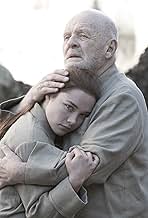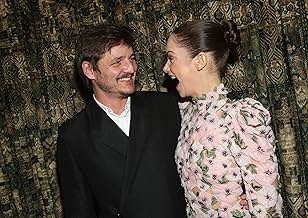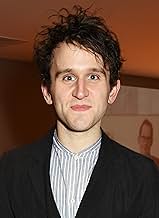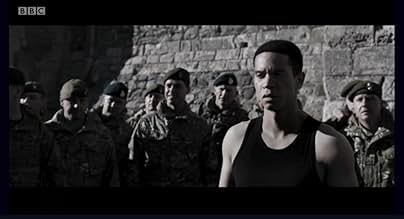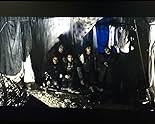CALIFICACIÓN DE IMDb
6.2/10
4.6 k
TU CALIFICACIÓN
Un rey envejecido invita al desastre cuando abdica el trono en favor de sus hijas corruptas, y rechaza a la que es afectuosa y honesta.Un rey envejecido invita al desastre cuando abdica el trono en favor de sus hijas corruptas, y rechaza a la que es afectuosa y honesta.Un rey envejecido invita al desastre cuando abdica el trono en favor de sus hijas corruptas, y rechaza a la que es afectuosa y honesta.
- Dirección
- Guionistas
- Elenco
- Nominado a 1 premio Primetime Emmy
- 1 premio ganado y 17 nominaciones en total
- Dirección
- Guionistas
- Todo el elenco y el equipo
- Producción, taquilla y más en IMDbPro
Resumen
Reviewers say 'King Lear' (2018) is lauded for its exceptional cast, especially Anthony Hopkins, Emma Thompson, and Emily Watson, and its modern setting that revitalizes Shakespeare's text. However, Hopkins's performance is criticized as one-note, and the film's heavy abridgement is faulted for losing crucial scenes and character depth. The modern setting is seen as both innovative and gimmicky, impacting the original context. Despite these issues, the adaptation is considered visually striking and emotionally resonant.
Opiniones destacadas
Most Shakespeare plays have been set in modern times by now, so the idea is far from revolutionary, but it is done well. The cast is stellar, and the production is focused on them and the original text, instead of the setting, which gives this adaptation a theater feel, which will appeal to most Shakespeare fans.
Anthony Hopkins deserves his King Lear. The film is a good proof. And only problem about the new version of play could be only the expectation of the viewer. Maybe, too high. Because it is a beautiful film and it is not a real surprise . Impecable performances, seductive use of modern ingredients, political correctness. And the feeling to discover a sort of version of Titus Andronicus. Something is missing in the performance of Sir Hopkins. It is a correct Lear but nothing more. Like a well known lesson presented front to the class. A sort of sketch using familiar, for public, skills. After its end, not exactly The King Lear remains in memory but an admirable Regan, a precise Earl of Kent, a fine Goneril, an inspired Cordelia. King Lear is more a reflection of the other characters. So, a beautiful version. But one in the shadow of the others.
First of all, I LOVE Sir Anthony Hopkins. He is unquestionably one of the greatest actors working today. However, I am not entirely sure that a TV adaptation of King Lear suited him. His scenes of quietly controlled fury were utterly devastating and mesmerising. Unfortunately, his portrayal of madness contained too little light and shade and was mainly an unending tirade of poorly enunciated shouting which made the text extremely hard to follow.
I didn't care for the uneven, choppy direction and the gloomy cinematography, nor the wearying desire of Richard Eyre to push his personal, clumsily executed political points about immigrants and war.
On the plus side, Emma Thompson and Emily Watson are on majestic form as Goneril and Regan and show why they are, without question, two of our finest actresses. Thompson even manages to elicit some sympathy as a woman competely at the end of her tether with her increasingly belligerent and uncaring father.
Other notable performances are Tobias Menzies as the Duke of Cornwall who seems to have developed something of a niche for playing sexy, sadistic psychopaths. Christopher Eccleston, not usually associated with comedy, is also eye-catching as a very amusing and camp Oswald.
Finally, THAT scene with the Earl of Gloucester (Jim Broadbent) will have you reaching for a cushion to hid behind. Doctor Who was never this graphic!
I didn't care for the uneven, choppy direction and the gloomy cinematography, nor the wearying desire of Richard Eyre to push his personal, clumsily executed political points about immigrants and war.
On the plus side, Emma Thompson and Emily Watson are on majestic form as Goneril and Regan and show why they are, without question, two of our finest actresses. Thompson even manages to elicit some sympathy as a woman competely at the end of her tether with her increasingly belligerent and uncaring father.
Other notable performances are Tobias Menzies as the Duke of Cornwall who seems to have developed something of a niche for playing sexy, sadistic psychopaths. Christopher Eccleston, not usually associated with comedy, is also eye-catching as a very amusing and camp Oswald.
Finally, THAT scene with the Earl of Gloucester (Jim Broadbent) will have you reaching for a cushion to hid behind. Doctor Who was never this graphic!
The thing about seeing a performance of a part in a play or literary adaptation (or really any acting role) that one comes to regard as "definitive", is that such a performance will have a detrimental effect on one's ability to objectively judge any subsequent performance of that part, as any such performance will necessarily be found wanting. Antony Sher as Richard III in Bill Alexander's 1984 RSC production, Kenneth Branagh as Henry V in his own 1989 film adaptation (Enrique V (1989)), Harris Yulin as Willy Loman in David Esbjornson's 2010 Gate Theatre production of Death of a Salesman, Gillian Anderson as Blanche duBois in Benedict Andrews's 2014 Young Vic production of A Streetcar Named Desire, even something like Christopher Lee as Dracula or Marlon Brando as Kurtz in Apocalipsis (1979). All definitive.
For me, the definitive Lear is a no brainer - Owen Roe in Selina Cartmell's magisterial 2013 Abbey Theatre production. Roe was very much helped by the extraordinarily ambitious direction of Cartmell. However, irrespective of directorial assistance, the scenes on the heath (the so-called "unactable" portion of King Lear), were unlike anything I've ever seen, as Roe alternates, sentence by sentence (!) between a fairly standard (if brilliantly staged) raging at the heavens, and turning directly to the audience and speaking quietly and calmly, almost emotionlessly. Sentence. By. Sentence. Without breaking the metre of the iambic pentameter verse!! Of course, Cartmell's choice here is obvious; the use of two different styles of delivery serve as a succinct visual/aural metaphor for the inner turmoil of the character, but although it's a thematically simple enough device, it requires a performance of immense control to bring it off.
And then we have Anthony Hopkins in writer/director Richard Eyre's TV adaptation for the BBC. Oh dear.
His performance was never going to touch Roe's masterclass for me, but what's especially disappointing is how little interested he seems in doing anything beyond giving the barest essentials in his interpretation of the part.
Having said that, that Hopkins would appear in any filmic adaptation of Lear at all is unexpected. He has played the part before - over one-hundred performances in David Hare's 1986 National Theatre production; a run which was almost immediately followed by over one-hundred performances in Peter Hall's 1987 production of Antony and Cleopatra. Hopkins had been growing disillusioned with theatre acting for some time, and his success in films such as El hombre elefante (1980) and The Bounty (1984) served only to expedite his growing dissatisfaction. Disliking the experience of performing Shakespeare over two-hundred times in the course of two years, and feeling burnt out (who can blame him), after Antony finished its run, Hopkins moved to the US to pursue film acting full time. He has often spoken since about just how much he hated those two years, and how much he grew to loathe Shakespeare, particularly Lear. On his commentary track for Julie Taymor's Titus (1999), he points out that as far as he was concerned, he was done with Shakespeare, until Taymor convinced him to appear in the film adaptation of her own 1994 Theatre for a New Audience production. He also stresses that Titus will most likely be the last time in his life he plays Shakespeare (calling the performance his "swan song"). Obviously, he changed his mind (or Eyre changed it for him), but that he would do so with Lear, of all plays, is decidedly unexpected.
So, with that in mind, what exactly is wrong with his performance? How can someone who played the part over one-hundred times possibly give an under par performance? Well, probably because he played the role over one-hundred times. The performance is lethargic, jaded, lazy, as if it's routine, become so familiar that all meaning has evaporated from the text (similar to when you say a word over and over and it starts to sound strange). Hopkins plays Lear as an easy-to-anger man, used to getting his own way, with little time for sentiment, whose grip on reality is becoming increasingly tenuous. Nothing wrong with that - it's a very basic reading of the character, but still nothing inherently wrong with it. The problem is, we've seen Hopkins play this character before, or a variation thereof, in everything from Leyendas de pasión (1994) to Nixon (1995) to El hombre lobo (2010). Indeed, his performances in Eyre's Lear is, beat for beat, a virtual carbon copy of his performance in Taymor's Titus. There are many similarities between the characters, to be sure, but not so many that the parts should be played in exactly the same way (as a contrast, look at Brian Cox's performance in the two roles; Titus in Deborah Warner's ground-breaking 1987 RSC production, and Lear in Warner's 1990 National Theatre production - three years, and an ocean of interpretive difference separate the performances).
Hopkins's performance has two gears - scenery chewing and shouty scenery chewing. That's it. Compare the lack of pathos, emotion, or nuance in his performance to, for example, Cox, Paul Scofield (in Peter Brook's 1971 film - King Lear (1970)), Jüri Järvet (in Grigoriy Kozintsev's 1971 film - King Lear (1970)), Laurence Olivier (in Michael Elliott's 1983 TV movie for ITV - King Lear (1983)), or Anthony Sher (in Gregory Doran's 2018 RSC production). All of them show more range, and a wider and more complete understanding of the text than Hopkins's one note performance. Also, his tendency to pause in the middle of verse lines is extremely distracting, and completely disrupts the meter. Such pauses serve to create artificial caesuras in the iambic pentameter lines, turning the verse into a bizarre amalgamation of anapaestic and dactylic hexameters, and even heptameters. A stronger director would have stamped this out, or had the actor speak in prose (as a few of the other actors do), but to have the actor speak in verse, but show no respect for the verse is...strange.
Thankfully the rest of the cast are universally strong. And what a cast! Emma Thompson as an especially nasty Goneril; Jim Broadbent as a deeply sympathetic Gloucester; John Macmillan as a soft-spoken Edmund; Andrew Scott as a highly emotional Edgar; Jim Carter as a gruff Kent; soon-to-be-superstar Florence Pugh as a very young and wide-eyed Cordelia; Karl Johnson as a decidedly serious Fool; Christopher Eccleston as a suitably ridiculous Oswald; Anthony Calf as a take-charge Albany; and Chukwudi Iwuji as a considerate France. However, the film is stolen by the work of Emily Watson and Tobias Menzies as an insanely bloodthirsty Regan and Cornwall. Watson's Regan oozes raw sexuality, and the (very graphic) blinding scene clearly turns both of them on. Two terrific performances which left me wishing there was more of them together in the play.
Also impressive is Eyre's direction, although the lack of editing rhythm in the opening scene is a little strange, and the shot composition in places tends to flatten the image, making it seem a little like a filmed play. His decision to set the play in modern London, however, with Lear as a retiring pseudo-dictator, works very well (Edgar is an astrophysicist, Edmund is in the armed forces). In this context, the shopping mall scene is especially well conceived and executed, as a now quite mad Lear wanders around a near-derelict shopping mall in a bad part of town, dressed like a vagrant, pushing a shopping trolley, and talking to a doll. It's a deeply unsettling image that encapsulates perfectly just how far he has fallen. Also well conceived is the scene set in an asylum seekers' refugee camp. The political commentary is a little on the nose, as Lear looks around the camp at the faces of the refugees, forcing him to consider issues of which he's never before conceived, but it's effective, timely and non-intrusive.
So, all-in-all, a strong adaptation with an excellent cast brought down only by a weak central performance. Unfortunately, the part of Lear is so completely central, pivotal, and dominating, that if it doesn't work, there's a problem. Hopkins's performance isn't so bad as to distract too much from the excellent work done elsewhere in the piece, but what's annoying about it is it could easily have been so much better. Mind you, members of the cast have been active on Twitter and the interview circuit for the last couple of weeks talking about how much they loved working with Hopkins, and how tremendous they think he is in the role (oftentimes, going to the set even when they weren't working, just to watch him filming). So, what do I know?
For me, the definitive Lear is a no brainer - Owen Roe in Selina Cartmell's magisterial 2013 Abbey Theatre production. Roe was very much helped by the extraordinarily ambitious direction of Cartmell. However, irrespective of directorial assistance, the scenes on the heath (the so-called "unactable" portion of King Lear), were unlike anything I've ever seen, as Roe alternates, sentence by sentence (!) between a fairly standard (if brilliantly staged) raging at the heavens, and turning directly to the audience and speaking quietly and calmly, almost emotionlessly. Sentence. By. Sentence. Without breaking the metre of the iambic pentameter verse!! Of course, Cartmell's choice here is obvious; the use of two different styles of delivery serve as a succinct visual/aural metaphor for the inner turmoil of the character, but although it's a thematically simple enough device, it requires a performance of immense control to bring it off.
And then we have Anthony Hopkins in writer/director Richard Eyre's TV adaptation for the BBC. Oh dear.
His performance was never going to touch Roe's masterclass for me, but what's especially disappointing is how little interested he seems in doing anything beyond giving the barest essentials in his interpretation of the part.
Having said that, that Hopkins would appear in any filmic adaptation of Lear at all is unexpected. He has played the part before - over one-hundred performances in David Hare's 1986 National Theatre production; a run which was almost immediately followed by over one-hundred performances in Peter Hall's 1987 production of Antony and Cleopatra. Hopkins had been growing disillusioned with theatre acting for some time, and his success in films such as El hombre elefante (1980) and The Bounty (1984) served only to expedite his growing dissatisfaction. Disliking the experience of performing Shakespeare over two-hundred times in the course of two years, and feeling burnt out (who can blame him), after Antony finished its run, Hopkins moved to the US to pursue film acting full time. He has often spoken since about just how much he hated those two years, and how much he grew to loathe Shakespeare, particularly Lear. On his commentary track for Julie Taymor's Titus (1999), he points out that as far as he was concerned, he was done with Shakespeare, until Taymor convinced him to appear in the film adaptation of her own 1994 Theatre for a New Audience production. He also stresses that Titus will most likely be the last time in his life he plays Shakespeare (calling the performance his "swan song"). Obviously, he changed his mind (or Eyre changed it for him), but that he would do so with Lear, of all plays, is decidedly unexpected.
So, with that in mind, what exactly is wrong with his performance? How can someone who played the part over one-hundred times possibly give an under par performance? Well, probably because he played the role over one-hundred times. The performance is lethargic, jaded, lazy, as if it's routine, become so familiar that all meaning has evaporated from the text (similar to when you say a word over and over and it starts to sound strange). Hopkins plays Lear as an easy-to-anger man, used to getting his own way, with little time for sentiment, whose grip on reality is becoming increasingly tenuous. Nothing wrong with that - it's a very basic reading of the character, but still nothing inherently wrong with it. The problem is, we've seen Hopkins play this character before, or a variation thereof, in everything from Leyendas de pasión (1994) to Nixon (1995) to El hombre lobo (2010). Indeed, his performances in Eyre's Lear is, beat for beat, a virtual carbon copy of his performance in Taymor's Titus. There are many similarities between the characters, to be sure, but not so many that the parts should be played in exactly the same way (as a contrast, look at Brian Cox's performance in the two roles; Titus in Deborah Warner's ground-breaking 1987 RSC production, and Lear in Warner's 1990 National Theatre production - three years, and an ocean of interpretive difference separate the performances).
Hopkins's performance has two gears - scenery chewing and shouty scenery chewing. That's it. Compare the lack of pathos, emotion, or nuance in his performance to, for example, Cox, Paul Scofield (in Peter Brook's 1971 film - King Lear (1970)), Jüri Järvet (in Grigoriy Kozintsev's 1971 film - King Lear (1970)), Laurence Olivier (in Michael Elliott's 1983 TV movie for ITV - King Lear (1983)), or Anthony Sher (in Gregory Doran's 2018 RSC production). All of them show more range, and a wider and more complete understanding of the text than Hopkins's one note performance. Also, his tendency to pause in the middle of verse lines is extremely distracting, and completely disrupts the meter. Such pauses serve to create artificial caesuras in the iambic pentameter lines, turning the verse into a bizarre amalgamation of anapaestic and dactylic hexameters, and even heptameters. A stronger director would have stamped this out, or had the actor speak in prose (as a few of the other actors do), but to have the actor speak in verse, but show no respect for the verse is...strange.
Thankfully the rest of the cast are universally strong. And what a cast! Emma Thompson as an especially nasty Goneril; Jim Broadbent as a deeply sympathetic Gloucester; John Macmillan as a soft-spoken Edmund; Andrew Scott as a highly emotional Edgar; Jim Carter as a gruff Kent; soon-to-be-superstar Florence Pugh as a very young and wide-eyed Cordelia; Karl Johnson as a decidedly serious Fool; Christopher Eccleston as a suitably ridiculous Oswald; Anthony Calf as a take-charge Albany; and Chukwudi Iwuji as a considerate France. However, the film is stolen by the work of Emily Watson and Tobias Menzies as an insanely bloodthirsty Regan and Cornwall. Watson's Regan oozes raw sexuality, and the (very graphic) blinding scene clearly turns both of them on. Two terrific performances which left me wishing there was more of them together in the play.
Also impressive is Eyre's direction, although the lack of editing rhythm in the opening scene is a little strange, and the shot composition in places tends to flatten the image, making it seem a little like a filmed play. His decision to set the play in modern London, however, with Lear as a retiring pseudo-dictator, works very well (Edgar is an astrophysicist, Edmund is in the armed forces). In this context, the shopping mall scene is especially well conceived and executed, as a now quite mad Lear wanders around a near-derelict shopping mall in a bad part of town, dressed like a vagrant, pushing a shopping trolley, and talking to a doll. It's a deeply unsettling image that encapsulates perfectly just how far he has fallen. Also well conceived is the scene set in an asylum seekers' refugee camp. The political commentary is a little on the nose, as Lear looks around the camp at the faces of the refugees, forcing him to consider issues of which he's never before conceived, but it's effective, timely and non-intrusive.
So, all-in-all, a strong adaptation with an excellent cast brought down only by a weak central performance. Unfortunately, the part of Lear is so completely central, pivotal, and dominating, that if it doesn't work, there's a problem. Hopkins's performance isn't so bad as to distract too much from the excellent work done elsewhere in the piece, but what's annoying about it is it could easily have been so much better. Mind you, members of the cast have been active on Twitter and the interview circuit for the last couple of weeks talking about how much they loved working with Hopkins, and how tremendous they think he is in the role (oftentimes, going to the set even when they weren't working, just to watch him filming). So, what do I know?
Really did want to like this version of 'King Lear' more. The play itself is wonderful, very haunting and moving even if the titular character frustrates you at first (but one does grow to sympathise with him). Richard Eyre has done a fair share of interesting and well done theatre, film and television productions and is no stranger to Shakespeare, being director of the brilliant 'The Hollow Crown' adaptations of both 'Henry IV' parts. And of course the cast is a dream one.
'King Lear' (2018) has a lot of great things about it, but in my mind it didn't completely come together. It does laudably with a difficult play, but is rather uneven. As the cast are great and all give great performances in their own way, the atmosphere is strong and there are many memorable scenes and interactions. The truncations do hurt the pacing and storytelling sadly and quite badly and this is not one of Eyre's better overall directing efforts.
Lets start with the good things. The best thing about this 'King Lear' is the acting, which is very good to superb throughout in all the roles. Antony Hopkins mesmerises as Lear, showing poignant tragedy and titanic, near-histrionic fury in equal measure in a way that is intense, noble and affecting. Emma Thompson is a suitably venomous Goneril and Emily Watson was never this blood-thirsty, manipulative or deceptively caring. Jim Broadbent is tremendously powerful as Gloucester. Florence Pugh is very touching without being passive as Cordelia and John MacMillan is effectively creepy as Edmund. Very interesting portrayal of the Fool, not overplayed or annoying thankfully. The character interaction is also strongly handled, especially between Lear and Cordelia.
Enough of the production values are fine, the austerity of the setting and costumes suits the atmosphere of the story perfectly as it is an austere play without going too over the top in it. Steven Warbeck's score is haunting. Shakespeare's text is still complex emotionally and sheer poetry, it is a shame though that it is so heavily abridged. The story is compelling enough and has some great moments, the big scene between Lear and Cordelia brought tears to my eyes and the film has one of the most unsettling renditions of the gouging of the eyes scene.
However, there are quite a number of glaring flaws. The text is heavily abridged and with so much cut out the pacing and story suffer. As does some of the character writing. The pacing feels very rushed frequently and the story feels choppy and regularly confuses, even for somebody who is familiar with the play so goodness knows how those that are not would feel. A shame as there are scenes that are done very well, especially those aforementioned.
Furthermore, not all the characters are done justice. Lear, Cordelia and Gloucester are. Less successful in particular are Edmund and Regan, though as indicated they are both played excellently. Edmund is very sketchily written with underdeveloped motivations and Regan is not enough of the seemingly sympathetic and "we can trust her" character one thinks she is at first but comes over as manipulative and all round evil from the start. Eyre's direction has enough flashes of brilliance, but tends to be too heavy-handed. Some of the camerawork veers on gimmicky.
In conclusion, a lot to like but some big drawbacks too. Frustratingly uneven. 6/10.
'King Lear' (2018) has a lot of great things about it, but in my mind it didn't completely come together. It does laudably with a difficult play, but is rather uneven. As the cast are great and all give great performances in their own way, the atmosphere is strong and there are many memorable scenes and interactions. The truncations do hurt the pacing and storytelling sadly and quite badly and this is not one of Eyre's better overall directing efforts.
Lets start with the good things. The best thing about this 'King Lear' is the acting, which is very good to superb throughout in all the roles. Antony Hopkins mesmerises as Lear, showing poignant tragedy and titanic, near-histrionic fury in equal measure in a way that is intense, noble and affecting. Emma Thompson is a suitably venomous Goneril and Emily Watson was never this blood-thirsty, manipulative or deceptively caring. Jim Broadbent is tremendously powerful as Gloucester. Florence Pugh is very touching without being passive as Cordelia and John MacMillan is effectively creepy as Edmund. Very interesting portrayal of the Fool, not overplayed or annoying thankfully. The character interaction is also strongly handled, especially between Lear and Cordelia.
Enough of the production values are fine, the austerity of the setting and costumes suits the atmosphere of the story perfectly as it is an austere play without going too over the top in it. Steven Warbeck's score is haunting. Shakespeare's text is still complex emotionally and sheer poetry, it is a shame though that it is so heavily abridged. The story is compelling enough and has some great moments, the big scene between Lear and Cordelia brought tears to my eyes and the film has one of the most unsettling renditions of the gouging of the eyes scene.
However, there are quite a number of glaring flaws. The text is heavily abridged and with so much cut out the pacing and story suffer. As does some of the character writing. The pacing feels very rushed frequently and the story feels choppy and regularly confuses, even for somebody who is familiar with the play so goodness knows how those that are not would feel. A shame as there are scenes that are done very well, especially those aforementioned.
Furthermore, not all the characters are done justice. Lear, Cordelia and Gloucester are. Less successful in particular are Edmund and Regan, though as indicated they are both played excellently. Edmund is very sketchily written with underdeveloped motivations and Regan is not enough of the seemingly sympathetic and "we can trust her" character one thinks she is at first but comes over as manipulative and all round evil from the start. Eyre's direction has enough flashes of brilliance, but tends to be too heavy-handed. Some of the camerawork veers on gimmicky.
In conclusion, a lot to like but some big drawbacks too. Frustratingly uneven. 6/10.
¿Sabías que…?
- TriviaAt one point, Sir Anthony Hopkins tried to adapt the play into a movie and intended to star as King Lear. Naomi Watts was cast as Goneril, Gwyneth Paltrow as Regan, and Keira Knightley as Cordelia, but the project never got off the ground and was eventually cancelled.
- ConexionesFeatured in The 71st Primetime Emmy Awards (2019)
Selecciones populares
Inicia sesión para calificar y agrega a la lista de videos para obtener recomendaciones personalizadas
Detalles
- Fecha de lanzamiento
- Países de origen
- Sitio oficial
- Idiomas
- También se conoce como
- William Shakespeare's King Lear
- Locaciones de filmación
- Productoras
- Ver más créditos de la compañía en IMDbPro
Contribuir a esta página
Sugiere una edición o agrega el contenido que falta



